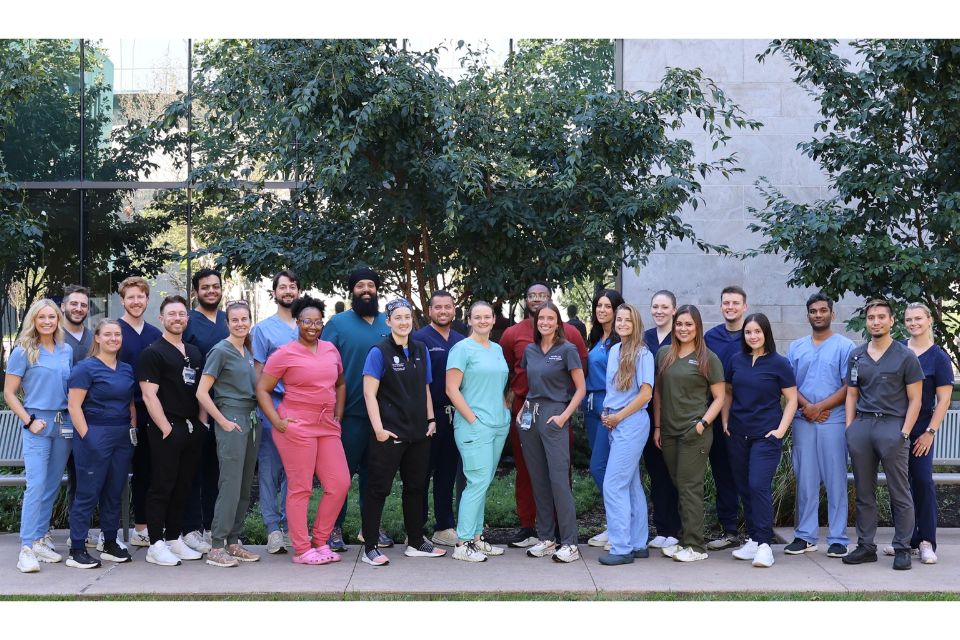Emergency Medicine Residency
SSM Health/Saint Louis University School of Medicine emergency medicine residency teaches fundamental skills, knowledge and humanistic qualities that constitute the foundation of emergency medicine practice.
Mission Statement
The Mission of the Saint Louis University Emergency Medicine Residency is to provide excellence in emergency medicine education and to deliver superior health care to the community of the Saint Louis Region.
Our residency seeks distinction in the fulfillment of its mission of teaching, research, health care, and service to the community. We are dedicated to provide leadership in the continuing quest for improving educational, healthcare, and community outcomes.
- Encourages and supports innovative scholarship and effective teaching as well as adapting to new innovations in educational theories and activities.
- Promotes the development of our residents by providing innovative teaching, formative feedback, and healthcare guidance and supervision of our unique critically ill patients at our urban tertiary care hospitals.
- Fosters university, departmental, and local programs in collaborative efforts to alleviate social injustice and disparities; extend compassionate care to the critically ill and needy; and maintain and improve the quality of life for all persons.
- Welcomes students, residents, faculty, and staff from all racial, ethnic, and religious backgrounds and beliefs to create a sense of community that facilitates their development as men and women.
- Supports the wellness and resilience of its faculty, residents, students, and staff.
- Wisely allocates its resources to maintain efficiency and effectiveness in attaining its mission and goals.
- Creates an academic environment that values and promotes free, active, and original intellectual inquiry among its faculty, residents, and students.
Letter from the Program Director
Thank you for your interest in our Emergency Medicine Residency Program. We received ACGME accreditation in 2008 and graduated our first class in 2012. Our program’s mission is to provide excellent emergency medicine education and deliver exceptional health care to the St. Louis region. Our three-year training program challenges residents to excel in a well-resourced academic environment, and it produces highly skilled emergency physicians both regionally and nationally.
SSM Health Saint Louis University Hospital opened in September 2020. It features a 43-bed emergency department with five dedicated trauma/resuscitation rooms, a 10-bed fast track and a dedicated behavioral health area. Additionally, it contains in-department CT and X-ray machines and is located directly in the OR, cath lab and neuro interventional suites. The hospital is in an urban setting in the heart of St. Louis, directly across from the School of Medicine. Our high-acuity emergency department provides residents with an extensive and diverse patient population for learning and service. We are a Level I trauma center accredited by the American College of Surgeons, and our high volume of trauma cases and critical care patients offers an unmatched clinical experience. We also serve as the tertiary referral hospital for the SSM Health St. Louis region and are a recognized STEMI and Stroke Center.
The St. Louis region has an established city pre-hospital system complemented by the Missouri Poison Center located at SSM Health Cardinal Glennon Children's Hospital and air medical services. These oustanding resources and educational tools offer great opportunities for our residents. Saint Louis University also has one of the few Air Force C-STAR programs in the nation.
Our division faculty supervise the residents' clinical experiences and teach at the bedside to offer immediate feedback. Our curriculum includes weekly didactic sessions, monthly simulations, qualifying exam preparation, procedural labs and ultrasound small-group sessions. We also host an annual cadaver lab to enhance residents' knowledge and procedural skills.
Through progressive responsibility, residents develop the skills to manage the flow of a busy emergency department, learn administrative skills, and provide effective team-based care. Graduates of our program have gone on to work in different settings throughout the country, pursuing fellowship training in simulation, education, critical care, wilderness medicine and emergency medicine services. Several of our alumni have become medical directors and academic faculty.
Thank you again for your interest in our program.
Craig Krausz, M.D.
Program director
